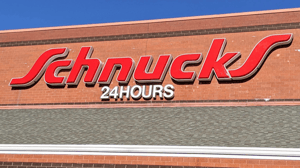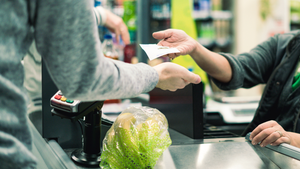Up In The Cloud
Food retailing may be a very down-to-earth business, but the technology behind it is beginning to exist in the cloud. The cloud in this case is the Internet, which is increasingly becoming a source of not only software applications but also computing platforms and processing. The virtual world of cloud computing is taking over some of the traditional physical world of bulky machines, enabling retailersPOS
April 19, 2010
MICHAEL GARRY
Food retailing may be a very down-to-earth business, but the technology behind it is beginning to exist in “the cloud.”
The cloud in this case is the Internet, which is increasingly becoming a source of not only software applications but also computing platforms and processing. The virtual world of cloud computing is taking over some of the traditional physical world of bulky machines, enabling retailers to not only reduce hardware and software investment but also improve services to customers, employees and vendors.
“Cloud computing is getting the attention of retail technologists as it offers a number of capabilities that add value to the technology effort of retailers,” said Thomas Murphy, president of Peak Tech Consulting, Colorado Springs, and a former Kroger IT executive. “A number of grocers do see the value of cloud computing and are considering a number of pilots.”
Cloud computing figures to be one of the key technologies retailers will leverage as they seek to double IT productivity over the next decade, said Bob Parker, group vice president of research, IDC Industry Insights, Framingham, Mass.
Evidence of the growth of cloud computing in retail comes in the form of a major new white paper (version 1.0) on that topic released in January by the Association for Retail technology Standards (ARTS), the standards division of the National Retail Federation, Washington. The study was produced by an ARTS member committee chaired by the Kroger Co. and IBM; the committee also included BJ's Wholesale Club, Lowe's Home Improvement, Microsoft, Oracle, Cisco, Epson, among others. (The Kroger Co. declined to comment for this article.)
Cloud computing lowers IT costs by allowing users to rent software and processing capacity on a pay-for-use basis instead of purchasing additional equipment, “permitting access to applications and files from anywhere,” said ARTS in a statement announcing the white paper. The hallmark of cloud computing is its elasticity — the ability to dial up or down IT resource usage, as circumstances require.
Many food retailers, including small independent operators, already have experience with cloud computing through vendors of applications like price optimization, website hosting, online meetings and others that operate on a software-as-a-service (SaaS) basis, the model by which retailers access an application via the Internet rather than install it internally on their systems. Last year, IT research consultant Gartner, Stamford, Conn., predicted that SaaS would experience a 25% increase in deployment by retailers in 2009, in part because of economic pressures on capital expenditures.
More than 100 retailers are using price optimization software from SaaS vendor Revionics, Roseville, Calif., said Jim Sills, chief technology officer for the firm. “And none have paid a dime for hardware [to run the application].” Another SaaS provider, Predictix, Atlanta, which offers promotional forecasting and optimization software over the cloud, leverages the cloud for its own computing power via enStratus Networks. Meanwhile, Google announced last month that more than 50 companies have agreed to sell software through the Google cloud-based online store, already the source of the company's own myriad business apps.
Beyond just SaaS, the growth of cloud computing in retail will also include platform-as-a-service (PaaS), which includes web capabilities and middleware, and infrastructure-as-a-service (IaaS), which delivers virtualized servers, network equipment, memory, CPUs and disk space.
Moreover, cloud computing is not just something offered on the Internet (the public cloud) but also something that can be constructed in-house by a retailer in the form of a private cloud, as well as a combination of the two (hybrid cloud). At an IDC conference on cloud computing last year, retail attendees expressed a particular interest in learning about private clouds, said Parker.
As with any new and evolving technology — especially one tied to the Internet — concerns remain about security, resource availability, network capacity, reliability and standards. “You have the normal issues of technology that must be understood and managed for this to be a viable alternative,” said Murphy. One IT executive at a West Coast retailer, who asked not to be named, said retailers should ask SaaS providers for evidence that their networks are secure.
And while public clouds charge on a pay-as-you-go basis, the cost of creating a public cloud can be significant, though retailers expect a solid return on their investment. In addition, since cloud computing represents a departure from traditional IT models, any major transformation would be daunting for retailers that have extensive investments in localized infrastructure, noted Murphy.
IDC's Parker expects retailers' IT infrastructures will evolve gradually to incorporate cloud-like capabilities. “There won't be a big bang,” he said.
RUNNING ON AMAZON
About six months ago wholesaler Unified Grocers, Commerce Calif., developed a disaster-recovery order collection application that runs “in the cloud” — that is, on Amazon Elastic Compute Cloud (EC2), a web service that provides “resizable compute capacity in the cloud,' according to its website. “We felt it was a perfect application to test cloud computing with limited exposure,” said Gary Herman, chief information officer for Unified Grocers.
This application allows Unified to redirect orders sent from its retail customers to the cloud if they are unable to connect to Unified's corporate data center or if the system that collects the orders is unavailable due to server issues. “Our store-level PC senses that we are unable to connect and then sends the orders to the cloud for later processing,” said Herman.
In the traditional scenario, Unified has to either wait until its data lines are available, or manually send the order files to its corporate office using FTP through the Internet. Unified originally planned to duplicate its collection hardware and software and put it in a secondary site, but using the cloud instead “saved us a significant capital investment,” said Herman. “We didn't have to buy a server.” In addition, the deployment has been quick and is based on pay-as-you-go usage.
“We have only been testing this [cloud] system for a couple of months in a few pilot stores,” he said. “So far it is working well.” He noted that the cloud is a good solution for an application like this that has “highly variable compute needs.”
But Herman said he would not put any sensitive data on the cloud due to security concerns. “Also, I am not ready to deploy mission-critical applications until this environment has proven its reliability.” His next cloud application is not yet determined.
The cost of using Amazon EC2 is broken down on its website. For Windows usage, the price of “on-demand instances” ranges from 13 cents per hour (standard) to $1.24 per hour (extra-large, high CPU).
Murphy suggested that all applications, with the exception of POS, should be evaluated for cloud computing. Some observers believe that with time and experience even POS transactions can be handled via the cloud, though a POS solution would need to meet demanding service levels for performance and availability. In fact, one vendor based in Italy is offering a cloud-based POS application. (See story, this page.)
Murphy observed that retailers that have expansive ecommerce or online initiatives “see the opportunities of cloud computing more than those who do not.” Indeed some retailers are leveraging cloud-based web analytics services such as Omniture and Webtrends that provide insights on visitors to their websites.
DEVELOPMENT AND TESTING
Some retailers have begun developing a private cloud that they own and manage inside their enterprises. A private cloud uses virtualization technology to derive greater efficiency from hardware, storage and networking. Like a public cloud, a private cloud “offers the ability to increase computing capacity for any given task automatically,” said the ARTS white paper. The West Coast retail IT executive said he feels “more comfort” with the security and availability of private clouds than with those of public clouds.
Supermarkets have shown an interest in using a private cloud for development and testing, said Johanna Koester, retail standards lead, IBM Software Group, Raleigh, N.C. (IBM is a provider of private cloud computing technology.) According to Koester, 30% to 50% of retailers' servers are dedicated to tests yet most of those servers run at less than 10% utilization. “The cloud is all about the more effective utilization of the resources you have,” she said. “With a private cloud for development and testing, you get up to 75% utilization of your resources. That saves a lot of money and can reduce labor costs 50%.”
Cloud computing is also a lot faster for development and testing than traditional methods. “When you virtually provision hardware and software, you can do it in minutes rather than weeks,” she said. “Developers working across different areas of the retail enterprise are able to automatically provision the development and test environment to use resources and give them back when they are finished.”
Some food retailers have begun developing a service-oriented architecture (SOA) for their IT systems whereby specific services are deployed to meet particular business needs. “SOA is about providing services while cloud computing is the platform to deliver those services,” said Koester. “They go hand in hand.” But cloud computing can be used without SOA, she noted.
ARTS promotes an “open standards” approach to cloud computing so that retailers are not locked into proprietary vendor solutions. Organizations addressing cloud standards include Open Cloud Manifesto, the Open Group Cloud Computing, and the Open Cloud Consortium.
About the Author
You May Also Like






